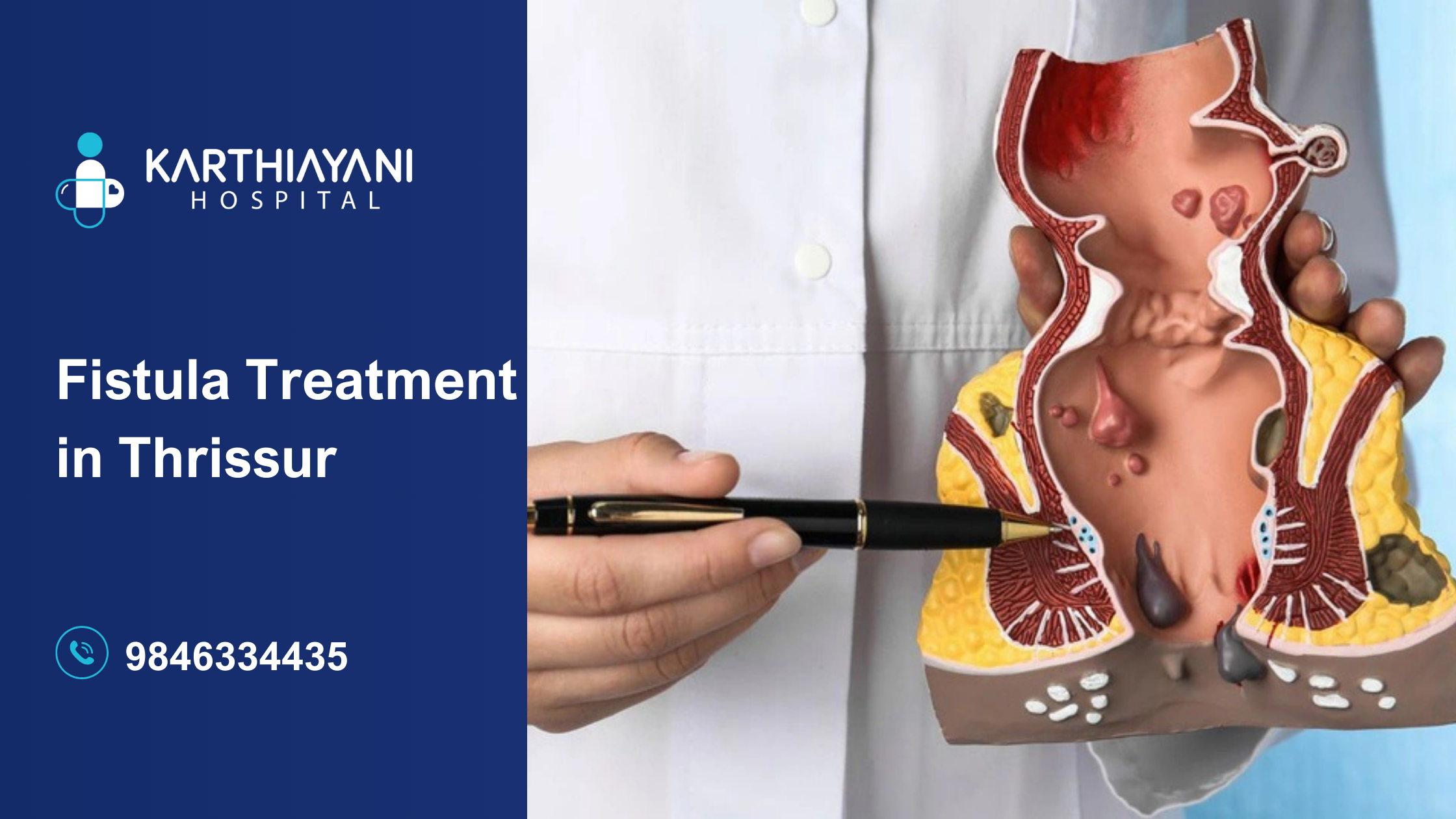
Fistula is a painful and distressing condition that requires expert medical intervention. If left untreated, it can lead to complications such as infections, abscesses, and severe discomfort. Thrissur, a city known for its excellent healthcare services, offers advanced fistula treatments with top hospitals and skilled surgeons specializing in proctology. Among the leading medical institutions, Karthiayani Hospital stands out as a trusted center for fistula treatment, offering state-of-the-art technology and patient-centric care.
What is a Fistula?
A fistula is an abnormal connection between two body parts that should not be connected. Anal fistulas are among the most common types and occur when an infected cavity near the anus fails to heal, leading to a tunnel formation between the anal canal and the skin.
Common Causes of Fistula
-
- Untreated abscesses
-
- Crohn’s disease or other inflammatory bowel conditions
-
- Trauma or injury near the anal area
-
- Radiation therapy complications
-
- Chronic infections such as tuberculosis
Symptoms of Anal Fistula
-
- Persistent pain and discomfort near the anus
-
- Swelling, redness, and irritation
-
- Pus or blood discharge
-
- Fever and chills in severe infections
-
- Foul-smelling drainage
Why Choose Karthiayani Hospital for Fistula Treatment?
Karthiayani Hospital in Thrissur is a top choice for fistula treatment due to:
-
- Experienced Proctologists & Surgeons: Experts in minimally invasive and advanced surgical techniques.
-
- State-of-the-art Technology: Advanced diagnostic and surgical equipment.
-
- Personalized Treatment Plans: Tailored approaches for each patient’s condition.
-
- Comprehensive Post-Surgical Care: Ensuring complete recovery and prevention of recurrence.
Advanced Fistula Treatment Options at Karthiayani Hospital
1. Fistulotomy
This is the most commonly performed surgery where the fistula tract is surgically opened, allowing it to heal from the inside out.
2. Seton Placement
A thread-like material (seton) is inserted into the fistula to allow continuous drainage and gradual healing.
3. LIFT Procedure (Ligation of Intersphincteric Fistula Tract)
A minimally invasive technique used for complex fistulas, preserving sphincter function and reducing incontinence risk.
4. Fibrin Glue Treatment
A non-surgical method where medical glue is used to close the fistula, promoting natural healing.
5. Advancement Flap Surgery
A technique that uses healthy tissue to cover the fistula opening, commonly used for deep and complex fistulas.
How Fistula Surgery is Performed?
-
- Diagnosis – Physical examination, MRI, or ultrasound to determine the severity.
-
- Anesthesia Administration – General or local anesthesia is provided for patient comfort.
-
- Surgical Procedure – Depending on the type of fistula, an appropriate surgical method is selected.
-
- Post-Surgical Care – Proper wound care and medication ensure a smooth recovery.
Post-Surgery Recovery and Care
-
- Pain Management – Prescribed painkillers help manage discomfort.
-
- Wound Care – Keeping the surgical area clean prevents infection.
-
- High-Fiber Diet – Avoids constipation and strain on healing tissue.
-
- Regular Follow-Ups – Ensures proper healing and prevents recurrence.
Lifestyle Modifications for Fistula Prevention
-
- Maintain Proper Hygiene – Keeping the anal area clean reduces infection risk.
-
- Eat a High-Fiber Diet – Prevents constipation and promotes smooth bowel movements.
-
- Stay Hydrated – Drinking plenty of water aids digestion and reduces strain during bowel movements.
-
- Avoid Straining During Bowel Movements – Excessive pressure can worsen the condition.
-
- Seek Prompt Treatment for Abscesses – Early intervention prevents fistula formation.
Risks and Complications of Fistula Surgery
While fistula surgery is generally safe, potential risks include:
-
- Infection at the surgical site
-
- Recurrence of the fistula
-
- Temporary or mild incontinence (in complex cases)
-
- Pain and discomfort during recovery
Alternative and Non-Surgical Treatments for Fistula
In some cases, non-surgical treatments may be considered, such as:
Lifestyle Modifications – Preventing complications through better hygiene and dietary changes
Antibiotic Therapy – To manage infections and reduce symptoms.
Dietary Adjustments – High-fiber foods to ease bowel movements.
Frequently Asked Questions (FAQs)
1.What causes an anal fistula?
Most commonly, anal fistulas result from untreated anal abscesses, infections, or conditions like Crohn’s disease.
2.What are the symptoms of a fistula?
Pain, swelling, pus drainage, discomfort during bowel movements, and fever.
3.How is an anal fistula diagnosed?
A physical examination and imaging tests like MRI or ultrasound are used.
4.Is fistula surgery painful?
Surgery is performed under anesthesia, so pain is minimal. Post-surgical discomfort is managed with medication.
5.What is the recovery time after fistula surgery?
Recovery can take 1-2 weeks for simple cases, while complex cases may require longer.
6.Can a fistula heal without surgery?
In most cases, surgery is necessary for complete healing.
7.What are the risks of fistula surgery?
Infection, recurrence, and incontinence are potential risks, though rare with proper care.
8.What is the success rate of fistula surgery?
The success rate is high, particularly with advanced techniques like LIFT and fibrin glue injection.
9Can diet affect fistula healing?
Yes, a high- fiber diet helps prevent constipation, which aids healing.
10.Where can I get the best fistula treatment in Thrissur?
Karthiayani Hospital offers expert care with experienced surgeons and state-of-the-art treatment options.